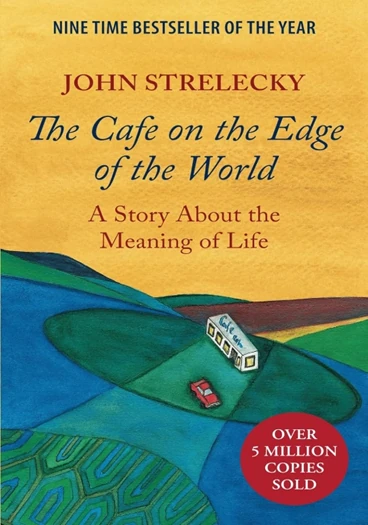Once while staying in a remote, quiet hill resort in the Kumaon Hills, I was bored in deafening silence, and my eyes went to a lonesome book lying on the sitting room table. I generally read books on military matters, but having not one, I picked up and glanced at this paperback edition, ‘The Cafe on the Edge of the World’—A Story About the Meaning of Life, written by John Strelecky. Sheepishly, I admit and regret NOT having heard about the author, spread in just 131 pages that have been ‘Nine Time Bestseller of the Year’ translated into 42 languages the world over and published by the US-based Aspen Light Publishing.
This simple but profoundly life-changing story is for anyone struggling to find his place in life. It revolves around a small, nowhere, remote café. A visitor discovers three peculiar questions on the menu, prompting him to engage in a conversation with three characters—Casey, Mike, and Anne—which many perceive as mystical and reminiscent of the Twilight Zone, to promote relaxation and rejuvenation.
Why are you here?
Do you fear death?
Are you fulfilled?
Spread over 131 pages, 26 small chapters, and an epilogue, the author sums up, ‘Why am I here?’ thus finding his Purpose For Existence, or PPE, as explored in conversations ignited by Anne, Casey, and Mike, expanding his universe of possible reasons for answering the above three questions in everyone’s life. With this food for thought and conversations with Casey, Mike, and Anne, whom he met in a remote café, the author embarks on a way to self-discovery and a life-changing journey applicable universally to every struggling human being with deep philosophical questions that urge readers to ponder their own existence.

I find the book written by the author from the perspective of ordinary people, drawn in a deceptively simple style, touching on three thorny questions about the compatibility of their consciences in the present-day materialistic living scenario. This slender book can be finished reading in one go, but changing to a simple philosophy wrapped in three simple questions is intriguing. Some of the most arresting parts of the book perhaps depict author John’s experiences and experiments in his life, which may be tinted with some guilt complex that we all have to varying extents in our lives. We all have our own experiences, some of them so unique, giving happiness and satisfaction, while others are bitter, saddening, and painful, and their introspection changes our thinking and the future course of our living for good or bad reasons.
Until a few years ago, I never considered myself a vegetarian. However, witnessing the fearful screams of a sacrificial buffalo during the Dussehra celebrations in the Assam Rifles, where the Gorkha and tribal troops predominate, profoundly influenced my decision to become a vegetarian for the rest of my life. But in this world, one’s food and thoughts could be another man’s poison. Likewise, when Waqar Younis and Wasim Akram, known as the 2Ws, intimidated the world’s best batsmen, followed by Shoaib Akhtar, nicknamed the Rawalpindi Express, Akram, while on commentary, said in Urdu, ’Pakistan Goshtkhor quom hai iss liye who takde aur sherdil hote hai (Pakistanis are non-vegetarians, and that is why they are strong and fearless, or words to that effect), not realizing that today ICC/world’s No. 1 Best Fast Bowler Bumrah from India is a vegetarian and so was late Major Shaitan Singh, PVC, Hero of Rezang La. It is just one’s belief and dedication to achieve that belief, and nothing new has been written by the author.
So, there is no real conflict, but the only exception is when it dawns on an individual. For all you know, it may never in some or many cases! It’s equally disheartening that the book doesn’t guide how to achieve happiness and fulfillment. If one just sits for a while contemplating what makes one happy, answers would vary with each individual as the hierarchy of needs and fulfillment varies from individual to individual. Most people automatically upgrade their needs after meeting basic needs, and the cycle continues from fulfilled needs to higher out-of-reach needs. And when higher needs are unfulfilled, anxiety, depression, and unhappiness prevail on all of us. So the book does not convey any magical solutions to happiness and fulfillment that one can search within oneself. John Strelecky is a US author of motivational books. His book The Café on the Edge of the World was initially self-published, but after its popularity for a year, it became the best-selling book translated into many languages worldwide. However, to too many of us, the book ‘The Cafe on the Edge of the World’ is pointless, blank, flat, poorly written, unconvincing, highly overrated, and an absolute disappointment with poor sentences and grammar and a waste of time in every respect, as possibly every human being in his or her lifetime must have at least some time(s) introspected on the above three questions. While some people may be influenced by such books at varying levels, the majority of others may not at all, as per an African saying, ‘No matter how long a log stays in water, it will never become a crocodile.’ Thus, the extreme praise and criticism of the book and the author rightly cover widely both the extremes.
